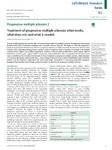Treatment of progressive multiple sclerosis: what works, what does not, and what is needed
| dc.contributor.author | Feinstein, A | |
| dc.contributor.author | Freeman, Jennifer | |
| dc.contributor.author | Lo, AC | |
| dc.date.accessioned | 2018-02-19T13:23:34Z | |
| dc.date.available | 2018-02-19T13:23:34Z | |
| dc.date.issued | 2015-02 | |
| dc.identifier.issn | 1474-4422 | |
| dc.identifier.issn | 1474-4465 | |
| dc.identifier.uri | http://hdl.handle.net/10026.1/10817 | |
| dc.description.abstract |
Disease-modifying drugs have mostly failed as treatments for progressive multiple sclerosis. Management of the disease therefore solely aims to minimise symptoms and, if possible, improve function. The degree to which this approach is based on empirical data derived from studies of progressive disease or whether treatment decisions are based on what is known about relapsing-remitting disease remains unclear. Symptoms rated as important by patients with multiple sclerosis include balance and mobility impairments, weakness, reduced cardiovascular fitness, ataxia, fatigue, bladder dysfunction, spasticity, pain, cognitive deficits, depression, and pseudobulbar affect; a comprehensive literature search shows a notable paucity of studies devoted solely to these symptoms in progressive multiple sclerosis, which translates to few proven therapeutic options in the clinic. A new strategy that can be used in future rehabilitation trials is therefore needed, with the adoption of approaches that look beyond single interventions to concurrent, potentially synergistic, treatments that maximise what remains of neural plasticity in patients with progressive multiple sclerosis. | |
| dc.format.extent | 194-207 | |
| dc.format.medium | ||
| dc.language | en | |
| dc.language.iso | eng | |
| dc.publisher | Elsevier BV | |
| dc.subject | Animals | |
| dc.subject | Depression | |
| dc.subject | Exercise Therapy | |
| dc.subject | Health Services Needs and Demand | |
| dc.subject | Humans | |
| dc.subject | Immunologic Factors | |
| dc.subject | Multiple Sclerosis | |
| dc.subject | Muscle Fatigue | |
| dc.subject | Physical Therapy Modalities | |
| dc.subject | Treatment Outcome | |
| dc.title | Treatment of progressive multiple sclerosis: what works, what does not, and what is needed | |
| dc.type | journal-article | |
| dc.type | Journal Article | |
| dc.type | Review | |
| plymouth.author-url | https://www.ncbi.nlm.nih.gov/pubmed/25772898 | |
| plymouth.issue | 2 | |
| plymouth.volume | 14 | |
| plymouth.publication-status | Published | |
| plymouth.journal | The Lancet Neurology | |
| dc.identifier.doi | 10.1016/s1474-4422(14)70231-5 | |
| plymouth.organisational-group | /Plymouth | |
| plymouth.organisational-group | /Plymouth/Faculty of Health | |
| plymouth.organisational-group | /Plymouth/Faculty of Health/School of Health Professions | |
| plymouth.organisational-group | /Plymouth/REF 2021 Researchers by UoA | |
| plymouth.organisational-group | /Plymouth/REF 2021 Researchers by UoA/UoA03 Allied Health Professions, Dentistry, Nursing and Pharmacy | |
| plymouth.organisational-group | /Plymouth/Research Groups | |
| plymouth.organisational-group | /Plymouth/Research Groups/Institute of Health and Community | |
| plymouth.organisational-group | /Plymouth/Research Groups/Plymouth Institute of Health and Care Research (PIHR) | |
| plymouth.organisational-group | /Plymouth/Users by role | |
| plymouth.organisational-group | /Plymouth/Users by role/Academics | |
| plymouth.organisational-group | /Plymouth/Users by role/Researchers in ResearchFish submission | |
| dc.publisher.place | England | |
| dc.identifier.eissn | 1474-4465 | |
| dc.rights.embargoperiod | Not known | |
| rioxxterms.versionofrecord | 10.1016/s1474-4422(14)70231-5 | |
| rioxxterms.licenseref.uri | http://www.rioxx.net/licenses/all-rights-reserved | |
| rioxxterms.type | Journal Article/Review |


